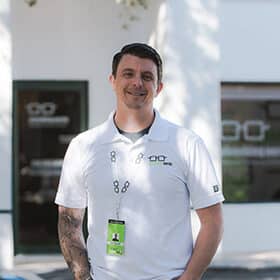Florida is known for its sunny and warm weather. But with average temperatures spiking into the 90s during summer, your home can quickly heat up to unsafe and uncomfortable levels. For this reason, your air conditioning system becomes a part of your daily life, so when you find a way to save a few dollars on your energy bills while keeping your home cool and comfortable, it’s wise to pursue the opportunity. Read on for a roundup of 12 tips for saving energy while keeping your home cool during summer.
1. Seal Air Leaks
As your home endures strong storms and temperature changes, adjoining home sections can gradually separate. Gaps around the doors and windows can open enough to allow conditioned air to escape, forcing your air conditioner to work harder than it should to achieve and maintain the set temperature. Sealing these gaps with weatherstripping and caulk will help enhance your home’s energy efficiency.
2. Get a Smart Thermostat
Your thermostat plays a key role in keeping your home comfortable in the summer. A smart thermostat features a Wi-Fi connection that allows you to control it remotely. You can program it to warmer temperatures while you’re away and cooler temperatures when you are home.
Some smart thermostats can receive weather updates, thanks to the Wi-Fi connection. This means that if a significant change in weather is expected, the thermostat can automatically adjust your AC system without requiring you to do it yourself. Therefore, you’ll not need to cool your house on an unusually chilly summer day.
3. Inspect Your Home’s Insulation
Insulating your home is one of the most affordable ways to make it more comfortable while reducing utility bills. If your home has a basement, an attic, or a crawl space, have our professional team check your insulation for holes, gaps, and cracks. Whether you use natural insulation, polyurethane foam, or Kingspan insulation, it is only effective when solid. We can seal any gaps with repair or caulking, so you can rest easy knowing you’re getting the most out of your cooling system.
4. Invest in an HVAC Maintenance Program
Keeping your HVAC system in tip-top shape is a sure way to improve your home’s energy efficiency. A maintenance program allows you to rely on a professional to inspect and service your system, inspect for leaks, unclog drainage within the system, lubricate moving parts, and check the integrity of all components. This will reduce the chances of your AC system malfunctioning and ensure it runs to its full capacity, saving you money in the long run.
5. Install Ceiling Fans
Ceiling fans are an effective way of cooling down your home during summer without consuming too much energy. They generate a breeze that makes your home feel a few degrees cooler, allowing you to raise your thermostat a few degrees to compensate, translating to less work for your air conditioner. This will save you money on utility costs and reduce wear on your system.
6. Use LED Bulbs
Although incandescent lightbulbs work perfectly for their purpose, you can considerably improve your home’s energy efficiency by replacing them with LEDs. LEDs generate bright light while consuming a fraction of the energy used by incandescent bulbs. Moreover, LEDs have a longer life span than incandescent lights, which means you’ll reduce your waste because you will not need to replace your bulbs as often.
7. Install a Tankless Water Heater
Traditional water heaters have storage tanks that hold hot water, which gets distributed throughout your home. The problem with this model is that it leads to passive energy usage because the heaters stay active even when you’re not using hot water.
Conversely, tankless water heaters don’t have a storage tank and don’t consume unnecessary energy. Instead, they feature a pipe that water moves through. Whenever you turn on the hot water faucet, the tankless water heater uses gas or electricity to heat water as it travels through the pipe. Therefore, it doesn’t require maintaining the warmth of a water tank consistently; it only activates on demand.
8. Install Energy-Saving Windows
Windows can be a primary source of wasted energy in your home. According to the Department of Energy, heat loss or gain through windows accounts for 30% of residential cooling and heating costs. If you’re heating your home during winter, the heated air can escape through the windows. Similarly, if you’re cooling your home in summer, the hot air can seep in and increase your indoor temperature. As a result, your HVAC system will need to work harder and longer to compensate.
For a considerable energy-saving win, consider replacing your current windows with energy-efficient ones, like those with impact-resistant glass. These windows form airtight seals when closed, stopping air from moving through. They also have a multi-layered, hybrid laminated glass ideal for insulating your home. Furthermore, you can tint your windows to further reduce the sun’s warming effects, helping you save on your cooling costs.
9. Buy ENERGY STAR-Rated Appliances
Older and less efficient appliances can use more energy than newer models. Thus, if you’re shopping for new appliances or electronics for your living room, kitchen, or laundry area, consider buying ENERGY STAR-rated products. Products with high ENERGY STAR ratings achieve high performance while consuming the lowest possible energy. When you replace your older appliances with ENERGY STAR-certified units, you stand to save money on utility bills in the long run.
10. Use Solar Energy
Florida has a lot of sunshine, so why not utilize it? Placing solar panels on your roof can help produce renewable energy and minimize your dependence on the grid. With the state’s net metering policy, you can even earn some dollars for any excess energy your panels produce.
11. Seal Ductwork
If your home has duct-based ventilation, you could lose a lot of cooled air into unoccupied rooms without even realizing it. If you have leaky ductwork, your HVAC system will not function correctly, resulting in energy losses. Having a professional thoroughly inspect your air ducts and seal leaky areas can help reduce air loss and decrease energy loss.
12. Repair Your Plumbing Leaks
Your home cannot be energy efficient without a professional plumbing inspection to help find and patch leaks. A single faucet leak can waste more than 1,500 gallons of water annually!
We recommend having a professional plumber out to your Florida home to inspect your faucets, pipes, and water-based appliances for leaks. At Plumbing, Cooling & Electrical Nerds, we’ll not only address apparent drips but also perform a video inspection to see inside the hidden areas of your plumbing system to find and fix sneakily leaky pipes.
We also recommend installing low-flow faucets and showerheads to conserve water and put less demand on your water heater, saving you money down the road.
If you’re looking for more ways to reduce your energy bills, the pros at Plumbing, Cooling & Electrical Nerds can help. We offer comprehensive plumbing and HVAC services in Southwest Florida. Contact us today for smarter and more reliable solutions.

